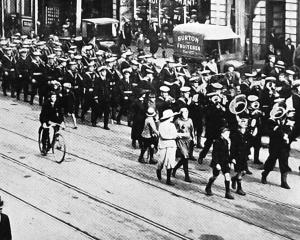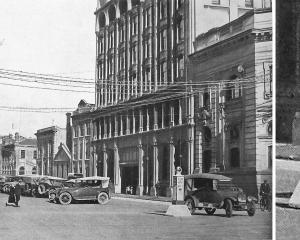
It is being suggested, rather than said outright, that these conscientious objectors are high-principled young men whose consciences will not allow them to fight. A long statement has been issued by the Defence Department to show that they are not and never have been anything of the kind.
It should be understood that objectors can, and are in practice, divided into three classes: (1) Religious objectors, who hold to certain sects, whose creeds are against the bearing of arms; (2) conscientious objectors, with real consciences; and (3) defiant objectors.
The religious objectors are housed in detention camps, doing work for the Agricultural Department. The real conscientious objector is almost as easy to deal with and he does not embarrass the authorities at all. The difficulty is with the defiant objector, of whom Mr Holland prates, and he is miscalled conscientious.
These defiant youths give no reasons for refusing to serve. They disobey all commands, and as soon as it is evident that a man means to persist with his defiance, he is tried by a military court for his first offence.
Social disease
In the course of an address on social disease, given to a large audience of men in His Majesty's Theatre last night, Captain Pettit expressed the belief that before long there would be insidious efforts made to spread generally among the young men of the community, a knowledge of prophylactic measures and to make these generally accessible.
If the State, in reconstruction after the war, was going to adopt towards the whole of our young manhood the attitude which the military authorities had felt themselves compelled to adopt as a measure of emergency in the army during the time of stress and strain and spread the knowledge of these measures it would lead our young manhood to feel that sexual indulgence was necessary and natural, was under State patronage, and free from risks of disease.
Old Identities meet
The Port Chalmers Old Identities' Association was favoured on Saturday with the most perfect weather for its second annual picnic, which was held at Portobello.
A number of people crossed from Port Chalmers in the morning, but the great bulk did not leave till about one o'clock, when the Tarewai, the Iona, and other craft had to make several trips before the waiting crowds were all taken across.
Mr J. Mill (ex-president of the association) expressed his pleasure in attending such a magnificent gathering of ''old identities'' and ''new iniquities''.
The ''new iniquity'', he said, had got civilised by contact with the old identities, and certainly if they followed in the footsteps of the pioneers they would come out all right in the end. It had been a great pleasure to meet so many old friends who had vividly reminded him of the early days.
Harbour picnics
The various bays down the harbour were the scene of a number of picnics on Saturday, and as the weather was all that could be desired the large crowds greatly enjoyed themselves.
- ODT, 25.2.1918.
COPIES OF PICTURE AVAILABLE FROM ODT FRONT OFFICE, LOWER STUART ST, OR WWW.OTAGOIMAGES.CO.NZ












